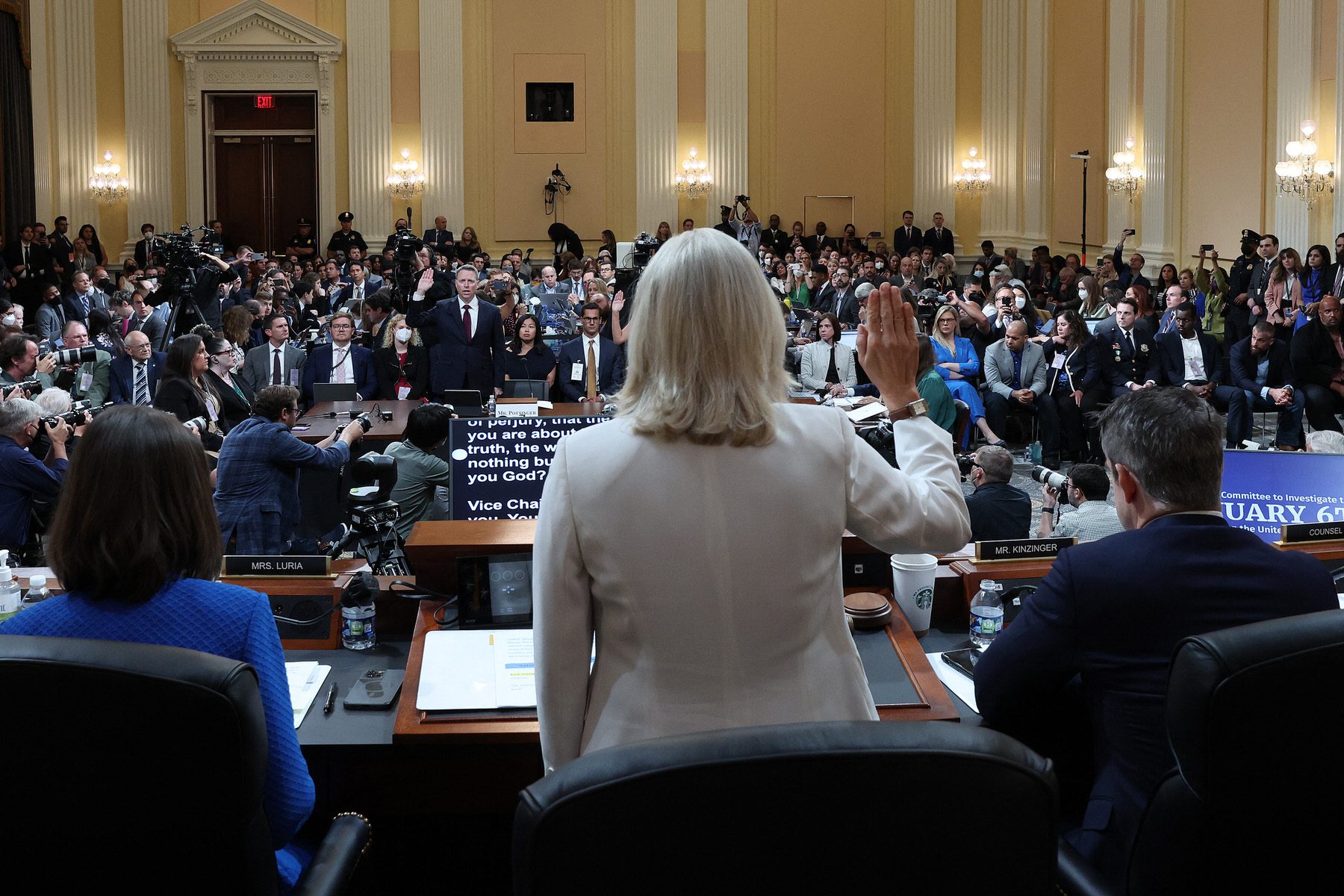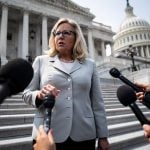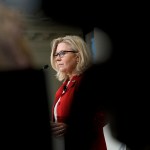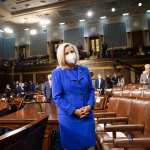The suffragists of the early 20th century famously wore white as they fought for the right for women to vote. On Thursday night, Rep. Liz Cheney also wore white as she centered the role of women in defending democracy once again.
Cheney, a Republican and the vice chair of the Select Committee to Investigate the January 6th Attack on the United States Capitol, invoked history as she asked viewers to seek accountability for the actions of a former president who sought to overturn an election. In her closing remarks, Cheney mentioned the 1918 congressional hearings that led to women’s right to vote and paid tribute to the witnesses who have come forward for their “bravery and honor” as an “inspiration to American women and to American girls.”
“We owe a debt to all of those who have and will appear here,” Cheney said.
Following a line of witnesses before her in previous weeks, Sarah Matthews, the former deputy White House press secretary, testified on Thursday that the attack on the Capitol was the “darkest day in our country’s history” and said Trump’s actions that day cemented her decision to resign that day.
Cheney specifically highlighted the testimony of Cassidy Hutchinson, the former aide to the White House chief of staff, who last month provided a moment-by-moment breakdown of January 6 from her unique vantage point within the former president’s inner circle. Hutchinson described several instances that day where men decades her senior and with far more power called on her to help manage the president’s pronouncements and transport.
“She sat here alone, took the oath and testified before millions of Americans,” Cheney said in reference to Hutchinson, who was 25 when she testified. “She knew all along that she would be attacked by President Trump and by the 50-, 60- and 70-year-old men who hide themselves behind executive privilege. But like our witnesses today, she has courage and she did it anyway. Cassidy, Sarah and our other witnesses, including Officer Caroline Edwards, Shaye Moss and her mother, Ruby Freeman, are an inspiration to American women and to American girls.”
-
More from The 19th
- White House aide Cassidy Hutchinson details how powerful officials leaned on her to ‘figure it out’ on Jan. 6
- ‘I was slipping in people’s blood’: Capitol Police Officer Caroline Edwards testifies at first January 6 hearing
- ‘I felt horror, absolute horror’: Rep. Carolyn Maloney of New York recalls the Capitol riot
During the panel’s first hearing, Capitol Police Officer Caroline Edwards, who was tear-gassed and knocked unconscious on the steps of the Capitol, recalled that January 6 was a “war scene” with officers on the ground, throwing up and bleeding. In another hearing, Ruby Freeman and her daughter, Shaye Moss, both election workers in Georgia, described in detail what it felt like to be singled out by former President Donald Trump and his advisors. Freeman and Moss faced sexualized threats, home break-ins and death threats after officials made baseless claims into the integrity of their work counting votes.
Kristin Olbertson, an associate professor at Alma College in Michigan, said Cheney’s choice of language in highlighting the women witnesses was intentional, especially since she noted that some older men in Trump’s orbit pointed to executive privilege in refusing to fully testify. Separately, the panel showed video footage of Sen. Josh Hawley of Missouri running from the Capitol, avoiding the same people he had seemingly encouraged hours before.
“Women are appearing in all of her comments as active, as courageous, as being actors for democracy,” she said.
Cheney’s closing remarks included a summary of Trump’s actions on January 6 and how his public rhetoric was tied to his efforts to overturn the 2020 election results. Cheney asked viewers whether Trump, who is considering another run for president, should ever be trusted again with any position of power.
“I read them as really pitched toward, or oriented toward, the importance of voting and voters in a democratic system of government,” Olbertson said. “Reminding us that ultimately, the authority lies with voters, that we delegate our authority to our representatives and government by exercising our right to vote, that that right has been hard fought for the majority in fact of the population and we ought not take it for granted. And it really stands in contrast with the violent mob actions on January 6 at the Capitol, that that was profoundly undemocratic.”
Cheney also noted the significance of the room as a convening place in 1918 for members of Congress to discuss women’s suffrage.
“This room is full of history, and we on this committee know we have a solemn obligation not to idly squander what so many Americans have fought and died for,” she said.
Rachel Gunter is a Texas-based historian who studies women’s suffrage and married women’s citizenship, which was based on their husband’s citizenship status in the Progressive Era. She said there’s significance in Cheney highlighting the year 1918 instead of the 1920 ratification of the 19th Amendment that gave women the right to vote based on sex — a right primarily granted to White women — and connecting it to the hearings happening now.
“I think she’s trying to make the point that hearings have done things for democracy in our past,” she said. “We need to not underestimate what hearings can do. Because 1918 — nobody really knew if that thing was gonna pass. It’d been blocked several times. They weren’t sure. … We look back at 1918 going, ‘Well, of course two years before suffrage.’ But in 1918, they had no idea if they would win or not.”
Joanna Lydgate, CEO of the States United Democracy Center, tied the committee’s work to a history of women working to defend elections and democracy, citing Cheney and Rep. Elaine Luria of Virginia, the only Democrat on the panel whose seat is in a swing district.
“The political courage of women from both parties has been front and center in the January 6 Select Committee hearings,” Lydgate said in a statement. “Just last night, we saw both Rep. Liz Cheney and Rep. Elaine Luria put the country above politics, at risk to their careers, to bring accountability for the January 6 insurrection. Despite threats to their safety, Republican staffers have bravely testified about their experiences.”
Cheney is one of just two Republicans on the committee. House Republican leadership said they would not participate in an investigation after House Speaker Nancy Pelosi rejected two of their five appointees to the committee. Pelosi later appointed two Republicans, Cheney and Rep. Adam Kinzinger of Illinois.
One of only a few Republicans to publicly oppose Trump, Cheney faces a primary challenge next month from a candidate backed by the former president. But while her place in Trump’s Republican Party may not be clear, she holds many conservative views. She opposes abortion and celebrated the overturning of Roe v. Wade.
“I think she’s trying to find a vision of women’s empowerment that works for conservative voters, for her views, and possibly for the Republican Party going forward … and trying to find a path forward that doesn’t paint them as anti-woman for doing that,” Gunter said.
Cheney on Thursday night quoted Margaret Thatcher, a conservative and the first woman prime minister of the United Kingdom, saying: “Let it never be said that the dedication of those who love freedom is less than the determination of those who would destroy it.”
Jean Sinzdak, associate director of the Center for American Women and Politics, believes Cheney’s wardrobe was also aimed at sending a message, especially as she weighs her political future. She is currently seeking reelection in the House, but her supporters have floated her name as a future presidential candidate.
“It wasn’t accidental that she was wearing a white jacket, which is a symbol of the suffrage movement. Or that she invoked that particular moment in history in this closing speech. She doesn’t strike me as somebody who does things accidentally and so I have to believe there’s a strategy behind it.”
The panel, which was formed on July 1, 2021, held its first hearing on June 9. At the time, there were six hearings tentatively scheduled. In total, they’ve amassed evidence through interviews with more than 1,000 people, more than 100 issued subpoenas and dozens of recorded depositions. Still, the panel said new information continues to flood in and the investigation is ongoing.
Hearings will resume in September after Congress returns from a lengthy recess. It’s not clear how many more hearings will be scheduled before the committee is set to dissolve in January 2023, the start of a new Congress.
“Let me assure every one of you this,” Cheney said Thursday night. “Our committee understands the gravity of this moment, the consequences for our nation. We have much work yet to do.”






